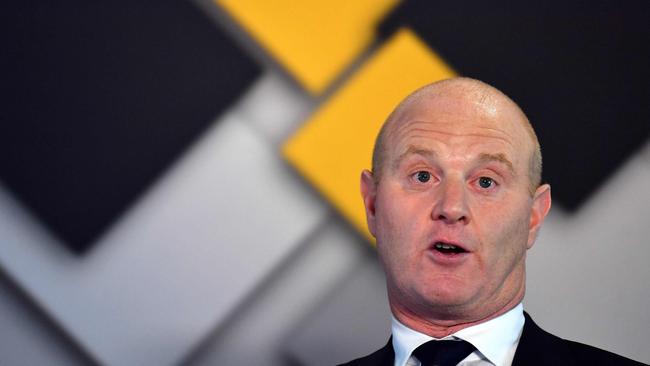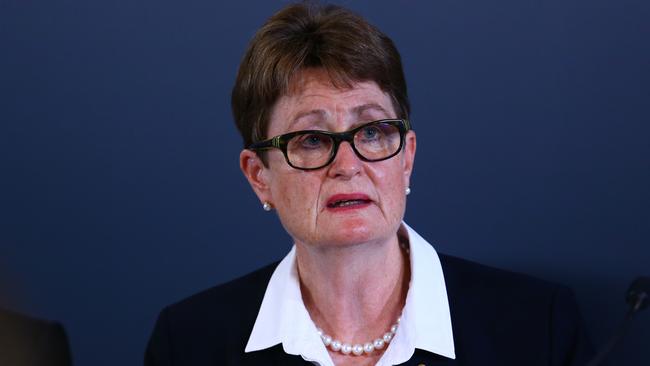CBA culture slammed in APRA report
CBA has been forced to top up capital levels by $1bn after a review of culture found big profits “dulled its senses” to risks.

The bank regulator has forced Commonwealth Bank to top up its minimum capital levels by $1 billion after a damning review of the lender’s culture found it guilty of “complacency”, a “reactive stance”, as well as being insular and not learning from experiences and mistakes.
It also found CBA’s bumper profitability “dulled” the bank’s senses to signals that might have otherwise alerted the board and senior executives to problems emerging inside the banks, as well as a deterioration in CBA’s risk profile.
CBA will also enter into an enforceable undertaking to conduct remedial action following the Australian Prudential Regulation Authority’s inquiry.
Treasurer Scott Morrison labelled the report “damning” and a “wake-up call” to every company board member in the country, but he also expected CBA board members to resign.
“A number of board members and executives have already gone,” he said. “My understanding is there will be others who will be leaving and that’s what I expect to happen.”
Mr Morrison also told reporters in Canberra: “The report, I think, is required reading not only for every financial institution in this country but, frankly, it should be the next item on the agenda of every single board meeting in this country regardless of whether you’re a bank or not.”
APRA was ordered in August last year to investigate the bank’s culture, governance, accountability and risk frameworks following a series of scandals at Australia’s biggest lender, which culminated in last year’s Austrac money-laundering scandal.
“The report ....found a number of prominent cultural themes such as a widespread sense of complacency, a reactive stance in dealing with risks, being insular and not learning from experiences and mistakes,” the APRA report said.
The report also noted “an overly collegial and collaborative working environment” which lessened the opportunity for constructive criticism or timely decision-making.
CBA said it would implement APRA’s recommendations and appoint an independent reviewer to report on its progress in reforming the bank’s culture.
The probe was overseen by former APRA chairman John Laker, company director Jillian Broadbent and former Australian Competition and Consumer Commission chairman Graeme Samuel.
Former chief executive Ian Narev retired from the bank earlier in April, while several top executives have left the bank. CBA retail banking boss Matt Comyn was named as the bank’s new boss following an international search this year.

The regulator’s move follows a series of scandals to engulf the bank in recent years.
Most recently, the anti-money laundering agency Austrac filed a civil case in the Federal Court early this month alleging CBA failed to properly report more than 50,000 transactions to the government while criminal syndicates were allegedly washing money through the lender’s smart ATM network.
The APRA review focused on the underlying reasons behind a string of incidents at CBA that have significantly damaged its reputation and public standing.
It found a common theme was that CBA’s strong profitability “dulled the institution’s senses” to signals that might have otherwise alerted the board and senior executives to a deterioration in CBA’s risk profile.
“This dulling was particularly apparent in CBA’s management of non-financial risks,” the report said.
“These risks were neither clearly understood nor owned, the frameworks for managing them were cumbersome and incomplete, and senior leadership was slow to recognise, and address, emerging threats to CBA’s reputation,” the report said.
“The consequences of this slowness were not grasped,” it said.
Mr Morrison said APRA’s findings were a warning to all boards, not just banks.
“It found there was a complacent culture, dismissive of regulators, an ineffective board that lacked zeal and failed to provide oversight, a lack of accountability and ownership of key risks by senior executives, a remuneration framework that had no bite, and that they were reactive, slow, and had under-resourced systems and processes internally.
“I want to stress while the CBA is a sound financial institution, and that issue is not in question, that rap sheet that I’ve just read out from APRA is damning.”
Among other conclusions the report found:
* Inadequate oversight and challenge by CBA’s board and its committees of emerging non-financial risks;
* Unclear accountabilities, starting with a lack of ownership of key risks at the executive committee level;
* Overly complex and bureaucratic decision-making processes that favoured collaboration over timely and effective outcomes and slowed the detection of risk failings;
* An operational risk management framework that worked better on paper than in practice, supported by an immature and under-resourced compliance function;
* A remuneration framework that, at least until the Austrac action, had little sting for senior managers and above when poor risk or customer outcomes materialised.
Given the issues raised a number of matters of prudential concern APRA has applied a $1 billion add-on to CBA’s minimum capital requirement. The additional capital comes at a time when new rules around capital are forcing banks to top up capital levels in order for their balance sheets to be “unquestionably strong”.
For shareholders the additional capital costs will have the impact of lowering CBA’s return of equity.
CBA has also agreed to an enforceable undertaking in response to the report.
APRA chairman Wayne Byres said the inquiry panel’s findings show CBA’s governance, culture and accountability frameworks and practices are in need of considerable improvement.
“As the panel notes, CBA has itself identified and begun taking steps to address many of these issues, but there is much to do and a risk that the same issues which have led to the need for the inquiry undermine the bank’s efforts to comprehensively and effectively respond to the recommendations”.
“CBA is a well-capitalised and financially sound institution but CBA itself had acknowledged shortcomings in governance, culture and accountability ahead of this inquiry.
“The comprehensive review, and set of recommendations set out by the panel, provides CBA with a clear path towards restoring its public standing,” Mr Byres said.
Among several recommendations APRA has urged CBA to overhaul its remuneration standards to ensure exacting accountability standards as well as substantially upgrading the authority and capability of risk management and compliance functions.
Mr Byres also said the findings of the report provide important insight for all financial institutions, particularly about the need to maintain a broad focus on all aspects of risk and stakeholder interest.
He said it was important “not to allow financial success to mask or detract from other important measures of an institution’s performance and risk profile.”
‘Hard work ahead of us’
In a statement following release of the APRA report, CBA said it would implement all its recommendations.
CBA chairman Catherine Livingstone said: “Addressing the findings of the report is a key focus for the Board and management to ensure that our governance, culture and accountability frameworks and practices are significantly improved and meet the high standards expected of us.
“Changes have been underway throughout 2017 at board and operational levels, and have continued this year, helping to rebuild customer and community trust. This includes the process of board renewal.
“Together they represent a significant change program and the APRA report provides us with a clear road map for the hard work still ahead of us.”

Ms Livingstone said CBA’s board would oversee a comprehensive response to the APRA report, and also appoint “an agreed, independent reviewer to report to APRA on our progress”.
“We understand the scale of change which is necessary and its seriousness in order for us to become a better, stronger bank for our customers, staff, regulators and shareholders.”
What APRA said about the CBA
* “CBA’s continued financial success dulled the senses of the institution”
* “Senior leadership was slow to recognise, and address, emerging threats to CBA’s reputation. The consequences of this slowness were not grasped.”
* “A widespread sense of complacency has run through CBA, from the top down.”
* “CBA was desensitised to failings with customers.”
* “CBA has been reactive - rather than proactive and pre-emptive - in dealing with risks.”
* “CBA turned a tin ear to external voices and community expectations about fair treatment.” * “Good intent has been too readily used to excuse poor risk outcomes.”
* “Complacency and reactivity led to a sense of ‘chronic ease’ in CBA.”
* “Various failings have culminated in a dilution of the ‘voice of risk’ and the ‘customer voice’.”
* “CBA has ‘fallen from grace’.”
With AAP






To join the conversation, please log in. Don't have an account? Register
Join the conversation, you are commenting as Logout